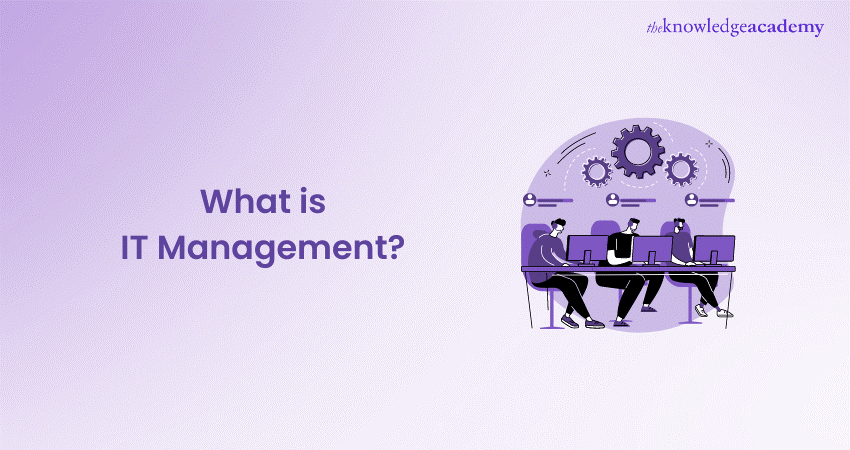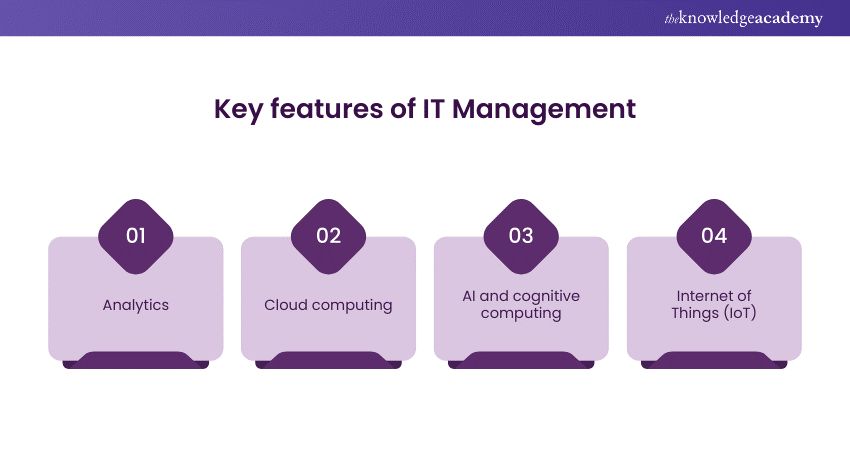We may not have the course you’re looking for. If you enquire or give us a call on 01344203999 and speak to our training experts, we may still be able to help with your training requirements.
We ensure quality, budget-alignment, and timely delivery by our expert instructors.

In a tech dominated world, it is impossible to move an inch without proper IT support. It provides the necessary backbone to businesses worldwide. IT now plays a critical role in strategic decision-making and achieving business objectives. This is exactly what brings the essence of What is IT Management into the foreground! It is a crucial area that ensures technological resources are utilised effectively and that aligns with the company's goals. This complete blog explores all facets of IT management, its importance, and the key practices that drive success.
Table of Contents
1) What is meant by IT Management?
2) Importance of IT Management
3) Key features of IT Management
4) Best practices in IT Management
5) Conclusion
What is meant by IT Management?
IT Management refers to the process of administering all matters related to Information Technology (IT) operations and resources within an organisation. It involves managing the IT department's strategy, infrastructure, and overall functionality to ensure technology resources are available and aligned with business strategies, which helps clarify the difference between IT Governance and IT Management, where governance focuses on overarching policies and control while management handles day-to-day operations. Effective IT management enables an organisation to optimise its technology usage, enhance efficiency, and achieve competitive advantage.
The importance of IT Management
The most important goals of IT management include ensuring reliability of IT infrastructure's, availability, and scalability. It also focuses on optimising resource utilisation. Along with it managing IT budgets properly and ensuring innovation to support the organisation's growth is also of utmost importance. Without effective IT management, organisation's risk of failing might be more. This can be due to outdated technologies, inefficient processes, and increased level of cyber threats. By achieving these objectives, businesses can enhance their operational efficiency. Along with that, they can also improve user satisfaction, and stand apart in a competitive market. In today's tech-driven world, IT management is more crucial than ever. It helps businesses:
1) Streamline operations: Automating routine tasks and improving workflows
2) Enhance security: Protecting sensitive data from cyber threats
3) Support decision making: Providing valuable data analytics and insights
4) Drive innovation: Leveraging new technologies to develop innovative products and services
Key features of IT Management
In the dynamic land of IT Management, several technological advancements have become key features. They significantly influence how organisations deploy, manage, and use technology for competitive advantage. Explore how analytics, cloud computing, AI and cognitive computing, and the Internet of Things (IoT) play vital roles in modern IT Management strategies:

Analytics
Analytics in IT Management refers to the systematic analysis of data and metrics. It helps in informing decision-making processes. This includes use of advanced analytics tools and methodologies. It extracts insights from data, which can then be used to optimise operations, improve customer experiences, and drive strategic initiatives. The key aspects include:
1) Predictive analytics: It uses historical data to predict future trends. This helps organisations anticipate issues, understand customer behaviour, and identify opportunities.
2) Performance analytics: It focuses on analysing the performance of IT infrastructure and applications, ensuring they meet the desired efficiency and reliability standards.
3) Data visualisation: Tools that present data in an easily digestible format. It enables decision-makers to grasp complex concepts and identify patterns quickly.
Cloud computing
Cloud computing has brough the necessary revolution. It offers adjustability, flexibility, and cost-effective solutions for storing data and deploying applications. It also eliminates the need for substantial upfront capital investment in hardware and reduces the burden on IT staff. This deduction in load is because of offloading maintenance and upgrades to the cloud provider. Its key features include:
1) Scalability
2) Disaster recovery and backup
3) Collaboration efficiency
AI and cognitive computing
Artificial Intelligence (AI) and cognitive computing are transforming IT Management. They enable smarter, automated, and more proactive operations. These technologies allow systems to simulate human thought processes. It learns from data and makes decisions with minimal human intervention. These applications include:
1) Automated problem resolution: AI tools can predict and diagnose IT issues before they impact business operations. This is often resolved without human intervention.
2) Enhanced security: AI and Machine Learning (ML) algorithms detect and respond to cybersecurity threats faster and more accurately. It is therefore more well-suited than traditional methods.
3) Optimised IT operations: Cognitive computing can analyse vast amounts of operational data to identify inefficiencies and recommend optimisations, leading to cost savings and improved performance.
Understand all the primary concepts of D programming language with our D Programming Language Training – join now!
Internet of Things (IoT)
The Internet of Things (IoT) refers to the network of physical objects ("things"). These are embedded with sensors, software, and other technologies to connect and exchange data with other devices and systems over the internet.
Incorporating these key features into IT Management practices allows organisations to enhance efficiency, foster innovation, and create a more resilient and agile IT infrastructure. As technology continues to evolve, staying abreast of these advancements and understanding how to effectively leverage them will be critical for IT leaders seeking to drive business value through their IT strategies.
Best practices in IT Management
Listed below are the best practices in IT Management:
1) Adopting a proactive approach
Proactively managing IT resources can help prevent issues before they occur, rather than reacting to problems after the fact. This involves regular system maintenance, monitoring, and forecasting future needs.
2) Emphasising on security
Given the increasing sophistication of cyber threats, prioritising IT security is non-negotiable. Regularly updating security protocols, conducting training sessions on cybersecurity awareness, and implementing robust access controls are essential measures.
3) Fostering collaboration
IT management should not operate in a silo. Collaborating with other departments ensures that IT strategies are aligned with the overall business objectives and that technology solutions meet the needs of various stakeholders.
4) Leveraging data for decision making
Utilising data analytics can provide valuable insights into operations, customer behaviour, and market trends. This information can guide strategic decisions, helping businesses to innovate and stay competitive.
Register today and learn the concept of data reshaping and regression with our R Programming Course!
5) Staying updated with technological trends
The technology landscape is constantly changing. Keeping abreast of the latest trends, such as cloud computing, AI, and machine learning, can help organistions leverage new opportunities and stay ahead in the market.
Conclusion
Understanding What is IT Management is a critical component of modern businesses. It enables organisations to use technology effectively to meet their strategic goals. By understanding the key aspects of IT Management and implementing best practices, businesses can improve their operations, enhance security, and drive innovation. As technology continues to evolve, the role of IT management will only grow in importance, making it an indispensable part of achieving business success in the digital age.
Attain knowledge of software essentials and various Operating Systems with our IT Training – join today!
Frequently Asked Questions
What does an IT manager do?

An IT Manager is responsible for maintaining all IT systems – both on-site and remotely.
Who works under IT manager?

As the IT manager is responsible for maintaining all system, a diverse range of professionals work under them. It ranges from engineers, operators, product managers, security practitioners, etc.
What are the other resources and offers provided by The Knowledge Academy?

The Knowledge Academy takes global learning to new heights, offering over 3,000 online courses across 490+ locations in 190+ countries. This expansive reach ensures accessibility and convenience for learners worldwide.
Alongside our diverse Online Course Catalogue, encompassing 19 major categories, we go the extra mile by providing a plethora of free educational Online Resources like News updates, Blogs, videos, webinars, and interview questions. Tailoring learning experiences further, professionals can maximise value with customisable Course Bundles of TKA.
What is the Knowledge Pass, and how does it work?

The Knowledge Academy’s Knowledge Pass, a prepaid voucher, adds another layer of flexibility, allowing course bookings over a 12-month period. Join us on a journey where education knows no bounds.
What are related courses and blogs provided by the Knowledge Academy?

The Knowledge Academy offers various Programming & DevOps Courses, including App and Web Developement, Database Training, Framework Training, Software Engineering Courses, and DevOps Certification. These courses cater to different skill levels, providing comprehensive insights into What is Software Architecture? Explained in Detail.
Our Programming & DevOps Blogs cover a range of topics related to IT Management approach, offering valuable resources, best practices, and industry insights. Whether you are a beginner or looking to advance your IT Management skills, The Knowledge Academy's diverse courses and informative blogs have you covered.






 Top Rated Course
Top Rated Course




 If you wish to make any changes to your course, please
If you wish to make any changes to your course, please


